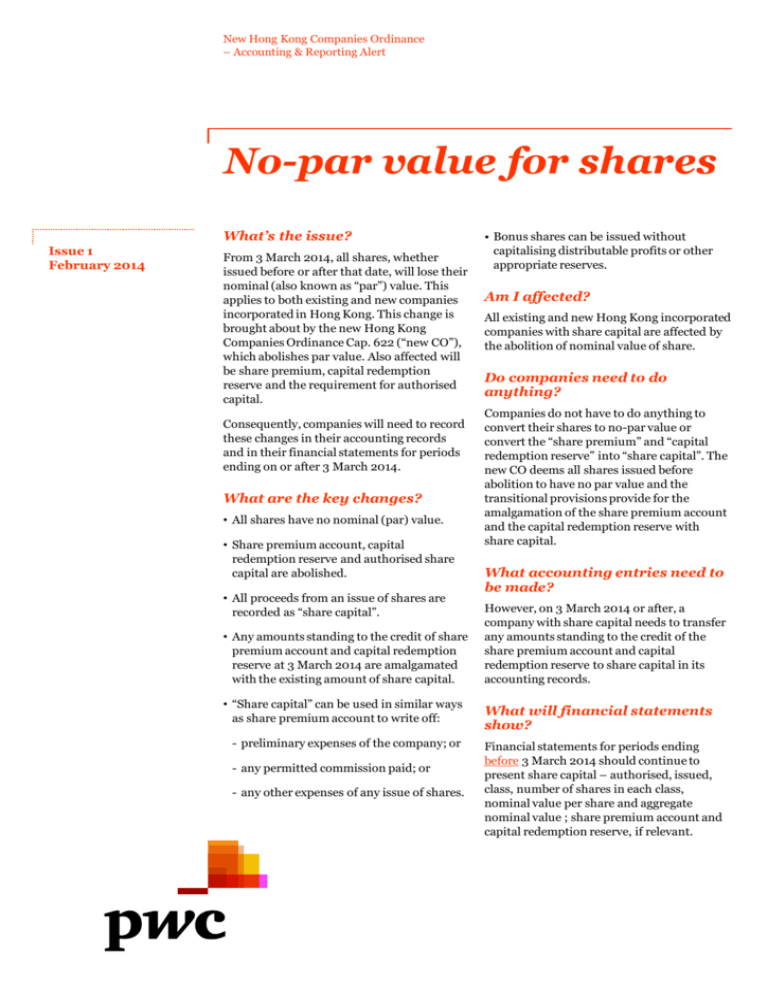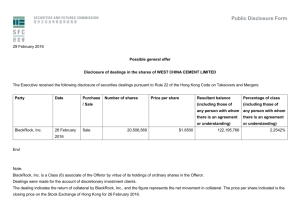
New Hong Kong Companies Ordinance
– Accounting & Reporting Alert
No-par value for shares
What’s the issue?
Issue 1
February 2014
From 3 March 2014, all shares, whether
issued before or after that date, will lose their
nominal (also known as “par”) value. This
applies to both existing and new companies
incorporated in Hong Kong. This change is
brought about by the new Hong Kong
Companies Ordinance Cap. 622 (“new CO”),
which abolishes par value. Also affected will
be share premium, capital redemption
reserve and the requirement for authorised
capital.
Consequently, companies will need to record
these changes in their accounting records
and in their financial statements for periods
ending on or after 3 March 2014.
What are the key changes?
• All shares have no nominal (par) value.
• Share premium account, capital
redemption reserve and authorised share
capital are abolished.
• All proceeds from an issue of shares are
recorded as “share capital”.
• Any amounts standing to the credit of share
premium account and capital redemption
reserve at 3 March 2014 are amalgamated
with the existing amount of share capital.
• “Share capital” can be used in similar ways
as share premium account to write off:
- preliminary expenses of the company; or
- any permitted commission paid; or
- any other expenses of any issue of shares.
• Bonus shares can be issued without
capitalising distributable profits or other
appropriate reserves.
Am I affected?
All existing and new Hong Kong incorporated
companies with share capital are affected by
the abolition of nominal value of share.
Do companies need to do
anything?
Companies do not have to do anything to
convert their shares to no-par value or
convert the “share premium” and “capital
redemption reserve” into “share capital”. The
new CO deems all shares issued before
abolition to have no par value and the
transitional provisions provide for the
amalgamation of the share premium account
and the capital redemption reserve with
share capital.
What accounting entries need to
be made?
However, on 3 March 2014 or after, a
company with share capital needs to transfer
any amounts standing to the credit of the
share premium account and capital
redemption reserve to share capital in its
accounting records.
What will financial statements
show?
Financial statements for periods ending
before 3 March 2014 should continue to
present share capital – authorised, issued,
class, number of shares in each class,
nominal value per share and aggregate
nominal value ; share premium account and
capital redemption reserve, if relevant.
What will financial statements show?
(continued)
What impact is there on classes of shares
and dividends?
That is, there is no change from existing presentation and
disclosure.
There is no impact on the classes of shares that a company
has in issue or the class rights attached to those shares. Where
rights to dividends on existing shares are expressed by
reference to their par value, for example, some preference
shares, the transitional provisions in the new CO will apply to
give affect as if their par value still exists.
Financial statements for periods ending on or after 3 March
2014 should show the transfer of the balances on the share
premium account and capital redemption reserve to “share
capital” in the Statement of Changes in Equity. Accordingly,
only the class, the number of shares in each class and the
aggregate amount credited to “share capital” will be
presented as “share capital” in the 2014 balance sheet and its
notes. The share capital note should provide a narrative
explanation that the changes are a result of the abolition of
nominal value of shares under the new CO.
The equity section of A Co., Ltd’s balance sheet and its
Statement of Changes in Equity are illustrated in the
Appendix.
Are the comparative balance sheet and its
notes restated?
The comparative balance sheet and its notes will not be
restated, as the changes are prospective from 3 March 2014.
Consequently, the comparative balance sheet and notes will
present the previously reported share capital, share premium
and capital redemption reserve amounts as separate line
items with accompanying details.
Which companies and their financial
statements will be affected first?
Companies (private and listed) with a financial year ending
on 31 March 2014 will be the first affected and have to deal
with the changes in their annual financial statements for that
year.
Hong Kong incorporated companies listed on the Stock
Exchange of Hong Kong or other bourses with a financial
year ending on or after 30 September 2014, which report half
yearly, will first deal with the changes in their interim
financial statements for the 6 months ending on or after
31 March 2014. Those listed companies that report quarterly
will deal with the changes in the interim financial statements
for the quarter ending on or after 31 March 2014.
PwC help
If you have questions or require further information,
please speak to your regular PwC contact.
www.pwchk.com
www.pwccn.com
2
Is the calculation of earnings per share
affected?
No. The abolition of nominal value will have no impact on the
calculation of earnings per share (EPS), as the number of
shares is unaffected by the change. For the purpose of
calculating basic and diluted EPS, the weighted number of
shares to be used will still be calculated in accordance with
paragraphs 19, 26 and 36 of Hong Kong Accounting Standard
33, Earnings per Share.
Are companies not incorporated in Hong
Kong affected?
No. Companies incorporated outside of Hong Kong are not
affected. They will continue to comply with the legal
requirements on share capital of the country in which they are
incorporated.
Do directors need to take any other action?
The transitional provisions in the new CO are intended to
provide legislative safeguards to ensure that contractual
rights defined by reference to par value and related concepts
will not be affected by the abolition of par.
However, the Hong Kong Companies Registry suggests in its
External Circular No. 7/2012 that directors may wish to
review their companies particular situations before 3 March
2014 to determine whether they need to introduce more
specific changes to their companies’ documents. Examples
could include their Memorandum and Articles of Association,
contracts, trust deeds, convertible bonds or preference shares
and share certificates. Directors should seek independent
legal advice, if necessary.
Further information
Hong Kong Companies Registry website provides further
information on the abolition of par value and other aspects of
the new CO.
www.cr.gov.hk/en/companies_ordinance/index.htm
APPENDIX
Application of the new no-par value regime
Effect on financial statements for accounting periods ending on 31 March 2014
A Co., Ltd is an existing Hong Kong incorporated company, with a 31 March year end. It has in issue 1,000 shares with
nominal value of HK$1 each and has a share premium account of HK$9,000. It also has a capital redemption reserve of
HK$500 arising from the redemption of some shares in a previous year.
In the year to 31 March 2014, there are no changes to the number of issued shares, but A Co., Ltd earns profits of HK$200. It
had HK$1,000 of retained earnings at 31 March 2013.
Illustrative A Co., Ltd balance sheet equity section
31 March
2014
HK$
Share capital (1,000 shares issued and fully paid) (Note 1)
Share premium
Capital redemption reserve
Retained earnings
Total equity
10,500
1,200
11,700
2013
HK$
1,000
9,000
500
1,000
11,500
Note 1
2014 - Share capital note will disclose class(es) of issued shares, number of issued shares and aggregate monetary
amount per class. It should also provide a narrative explanation of the changes due to the abolition of par value of
shares.
2013 – Share capital note will disclose authorised share capital, class(es) of issued shares, nominal value per share of
each class and aggregate nominal value per class.
Illustrative A Co., Ltd Statement of Changes in Equity
Balance at 1 April 2013
Transfers on 3 March 2014
Profit for the year
Balance at 31 March 2014
Share capital
HK$
1,000
Share
premium
HK$
9,000
Capital
redemption
Reserve
HK$
500
Retained
earnings
HK$
1,000
Total
equity
HK$
11,500
9,500
10,500
(9,000)
-
(500)
-
200
1,200
200
11,700
This content is for general information purposes only, and should not be used as a substitute for consultation with professional advisors.
© 2014 PricewaterhouseCoopers. All rights reserved. PwC refers to the Hong Kong member firm, and may sometimes refer to the PwC network.
Each member firm is a separate legal entity. Please see www.pwc.com/structure for further details.
3









